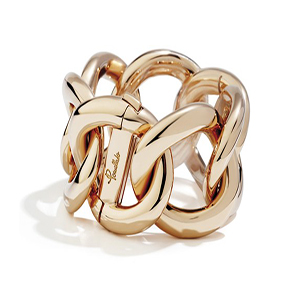The French conglomerate said it would support the international development of the Pomellato and Dodo jewelry brands.
Financial terms of the agreement with RA.MO SpA were not disclosed. Kering noted that Andrea Morante would remain chief executive officer of the company, which posted 2012 revenues of 146 million euros, or $186.9 million at average exchange rates.
Kering characterized the transaction, which is to be finalized in the coming weeks, as complimentary to its other jewelry brands.
Last December, Kering snapped up the Chinese fine jewelry maker Qeelin. Its other holdings in hard luxury include the Place Vendôme jeweler Boucheron and Swiss watch brands Girard-Perregaux and Jean Richard.
The development ends months of speculation around family-controlled Pomellato and follows two high-profile deals in the jewelry sector in the past two years: Swatch Group’s acquisition of Harry Winston and LVMH Moet Hennessy Louis Vuitton’s takeover of Bulgari in a cash-and-share swap. Kering, previously known as PPR, was frequently said to be looking at Pomellato.
Pomellato was founded in 1967 by Pino Rabolini, whose family was its main shareholder, followed by the Damiani Group with an 18 percent stake, and Morante.
The Pomellato brand accounted for 65 percent of revenues last year, while the more affordable Dodo collections of animal-shaped charms made up for the rest. Earnings before interest, taxes, depreciation and amortization (EBITDA) totaled 19.8 million euros, or $25.3 million.
Sources said the price was set at about 14 to 15 times the company’s EBITDA, indicating that Kering paid between 277 and 297 million euros, or $360.8 million and $387 million at current exchange rates, to acquire the company.
Morante, a high-profile entrepreneur-cum-investment banker, had been eyeing a listing for Pomellato. Last October, Morante said Pomellato was looking at brand extensions with watches and a fragrance, had plans to further develop the Asian and American markets and was evaluating an initial public offering. At the time, he said the Rabolini family was not looking to sell.
Pomellato had expressed interest in buying the 18 percent of shares owned by the Damiani family, which two years ago assigned Mediobanca a mandate to explore offers, but an agreement was never reached. Sources said Damiani came back to Rabolini recently to try and buy Pomellato.
Pomellato has been investing in retail, doubling the number of stores over three years. At the end of 2012, there were 45 Pomellato flagship stores and 41 Dodo units. Italy, France, Germany, the U.S., Switzerland and Japan are the company’s main markets. There are around 500 points of distribution globally.
Exports in 2012 were slated to account for almost 57 percent of sales. Sales in the U.S. in 2012 were expected to account for 12.1 percent of total revenues compared with 6 percent three years ago.
Pomellato’s fragrance licensed to CR-ITF will make its debut in September.
Swatch was also rumored to be looking at Pomellato to replicate its watch success in the jewelry arena with the Dodo line.
Last fall, the company launched its first silver collection, Pomellato 67, comprising 47 silver pieces, with an event during Milan Fashion Week. “This is more than [just] expanding the brand. In this case, we see it as a new collection and, potentially, a new brand,” Morante said at the time. All jewelry in the new silver range, named after the year the company was founded, is produced in the same Milan factory as the main gold line.
In terms of revenues, Pomellato is the fifth-largest jewelry brand in Europe after Cartier, Chopard, Bulgari and Tiffany & Co.
Kering has often stated its preference for building critical mass from small to medium-size brands. For example, it multiplied the size of Balenciaga by 11times since it was acquired in 2001.
In January, Kering, then PPR, struck a deal to acquire a 51 percent stake in the London-based fashion house Christopher Kane.
Kering is exiting retail to focus on apparel and accessories in the luxury and sports-lifestyle segments.
Earlier this year, Kering said its Redcats division had reached an agreement to sell two Nordic brands for an enterprise value of 275 million euros, or $362.7 million at current exchange. Assets remaining in Redcats’ sprawling portfolio include La Redoute and Daxon.
Kering’s stable of brands includes Gucci, Yves Saint Laurent, Balenciaga, Stella McCartney, Bottega Veneta, Puma and Volcom.






